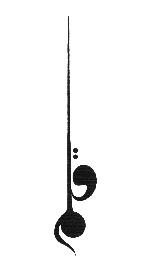It seems that Arabic words have a particular ability to sound freakishly violent and threatening whenever they are translated into English. A very large reason has to do with the disparate origins of both languages. English is one of several hundred Indo-European languages, and shares origins and grammatical nuances with languages as diverse as French, Spanish, Portuguese, even Urdu, Hindi, and Farsi. In definitional terms, Arabic is part of a group known as Afro-Asiatic languages, though saying that an Israeli, a Berber, and a Somali share etymological similarities can only lead to the makings of one long, inevitable corny joke. (So, an Israeli, a Berber, and a Somali walk into a bar...)
As a Semitic language, Arabic is most closely related to Hebrew, but Hebrew doesn't seem to stir that same guttural churning of hatred and fear as Arabic is so prominently able to do. The thing is, this has nothing to do with the Arabic language, nor its liturgical prevalence in Islam. Over the past several decades, the dominant spokesmen for everything Arabic, Arab, or Islam in the Western world has either been Qadaffi, Ayatollah Khomeini, bin Laden, Saddam, or any imam who wears a funny hat and wags his finger while spewing hatred about America, Israel, or anything Jewish. I guess this is partly amusing since Iranians don't even speak Arabic, nor consider themselves part of the Middle East.
So with that long-winded preface, I finally get to the name of this blog, "American Nusrah." In a characteristically strict translation, Nusrah means "seeking authority", "pledge", or "support". Obviously, that doesn't really explain much so it's important to look at the word from its historical perspective.
The concept of Nusrah was most notably maintained following the death of the last prophet of Islam, Muhammad (may Peace and Blessings be upon him). Following the Prophet's death, a power vacuum ensued, thus threatening the security and stability of the fledgling Muslim nation. The call came for establishing a new leader, one who was responsible, just, fair, and would promote the safety and security not only for Muslims, but for all people. After a leader was appointed, the people would pledge their unconditional support to him, in order to maintain the safety and stability of the land. That, in a nutshell, is the concept of Nusrah.
Consistent with early Islamic history, Nusrah was primarily used to establish and appoint a caliph. Following World War I and the resulting advent of a nation-state system, however, the caliphate era came to an end; but persecution, resource usurpation, and untold destruction of life and human well-being still remain.
What to do? What to do? In my mind’s eyes, the idea of a Nusrah still addresses these concerns, albeit with a commensurate, 21st century approach. My identity is Muslim, but it is also American, and I wanted a blog name to reflect that. And although I am Muslim, I cannot control what happens in the Middle East, Indonesia, or South Asia. They don't listen to me. Why should they? I was born in New York. But I think there are certain things this country—my home—can do to be more fair and just to its entire people, whether they are clean-shaven, blue-eyed Southerners or big-bearded mocha colored Northerners. I’m not a lobbyist, and I'm not into special interest. So here are my beliefs, out in the open. Thanks for listening.
Sunday, October 29, 2006
Subscribe to:
Post Comments (Atom)


No comments:
Post a Comment